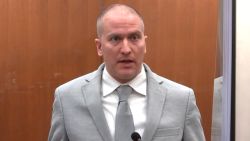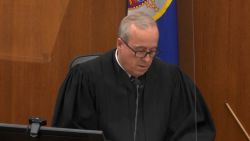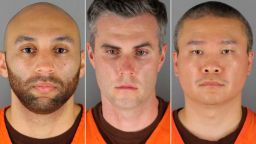Vivid images and testimony from the trial against Derek Chauvin are now seared into the memory of Brandon Mitchell, one of the jurors who convicted the former police officer of murdering George Floyd.
Inside the Minneapolis courtroom, “it was just dark. It felt like every day was a funeral and watching someone die every day,” Mitchell told CNN.
“It was tense every day. I wasn’t nervous, but it was stressful. It was a lot of pressure.”
The 31-year-old basketball coach is the first juror who deliberated in the trial to speak out about his experience. Lisa Christensen, an alternate juror, spoke to reporters last week.
But the names of other jurors might not be publicized for months.
Due to increased media attention and the “unprecedented” levels of incendiary, inflammatory and threatening emails that attorneys have received, Judge Peter Cahill ordered the names of the jurors not to be released for at least six months.
Chauvin’s confidence seemed to deteriorate
Mitchell said he noticed a sharp change in Chauvin’s demeanor over the course of the trial.
“To me, (Chauvin) started out really confident,” he said. “The first week, for sure – I felt like he was confident, his lawyers were confident. I could feel the confidence for sure.”
But “as the case went on, his demeanor kind of changed to more of a confused look – (like) this isn’t how it’s supposed to go,” Mitchell said.
“I didn’t see any remorse.”
The trial took a toll on the jurors. Mitchell said he hadn’t watched the full video of Floyd’s death before the trial because “it was too gruesome.”
He said he was moved to tears by the testimony of Floyd’s brother, Philonise Floyd. Mitchell said there were a few times he broke down after court.
Another poignant moment came when pulmonary expert Martin J. Tobin testified about Floyd’s last moments, explaining when he lost consciousness and when he says the video shows Floyd losing his life.
“Once Dr. Tobin was finished with his testimony, I felt like the trial was done,” Mitchell said. “He spoke everything in layman’s terms, and it made sense.”
Tobin testified that restraints on Floyd continued for about three minutes, even after he stopped breathing.
That testimony helped solidify the decision for Mitchell, who said he had an open mind at the beginning of the trial.
“During the opening statements, I was curious to find out what the defense was going to bring to the table and convince us jurors,” he said. “I didn’t see any avenues to which they could go.”
Inside the jury deliberations
The jury deliberated for about 10 hours, which legal analysts have said is a relatively short amount of time for such a case.
But Mitchell said he didn’t expect the jurors to deliberate for as long as they did. He said one juror needed more detail and explanation.
“I feel like the evidence was overwhelming,” he said. “But … decisions like that, when you’re deciding somebody else’s life, will never be that easy.”
During deliberations, the jurors revisited several exhibits presented during the trial, including the officers’ bodycam footage and some of the cell phone video.
Mitchell said some jurors wanted to hear from Chauvin, who did not testify on his own behalf.
“It’s human nature just to be curious: ‘Hmm, I wonder what this person was thinking of while this happened,’” Mitchell said.
But even if Chauvin did testify, Mitchell said he’s not sure that would have changed the verdict.
In the end, Chauvin was convicted on all charges after kneeling on Floyd’s neck for 9 minutes and 29 seconds.
He faces up to 40 years in prison for second-degree murder, up to 25 years for third-degree murder and up to 10 years for second-degree manslaughter.
Chauvin is scheduled to be sentenced by the judge on June 25.
‘We haven’t seen an outcome like this’
Mitchell, a Black man, said he knew the jury’s decision would become part of history.
He first shared his story with Grammy Award-winning gospel artist Erica Campbell and wrote in his jury questionnaire he wanted to serve “because of all the protests and everything that happened after the event.”
“This is the most historic case of my lifetime, and I would love to be a part of it,” he wrote.
Floyd’s death sparked months of protests and a national reckoning over policing and systemic racism in the US.
“We haven’t seen an outcome like this on a case. I really think this is a start, and I think it’s a good start,” Mitchell told CNN.
“And then all the attention that it is still getting – just keeping that magnifying glass there has to spark some kind of change.”
CNN’s Brad Parks, Carma Hassan, Eric Fiegel and Aaron Cooper contributed to this report.

























